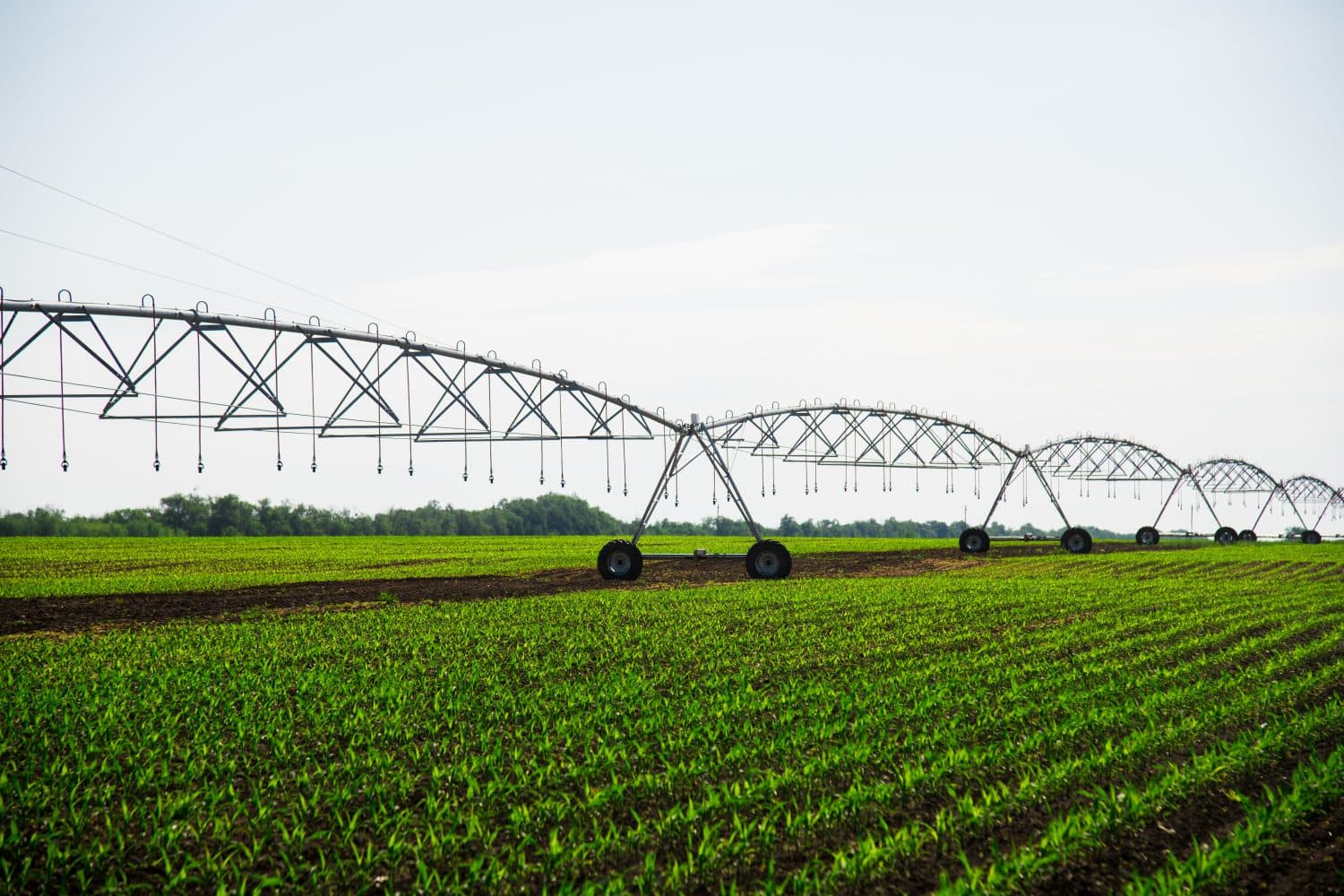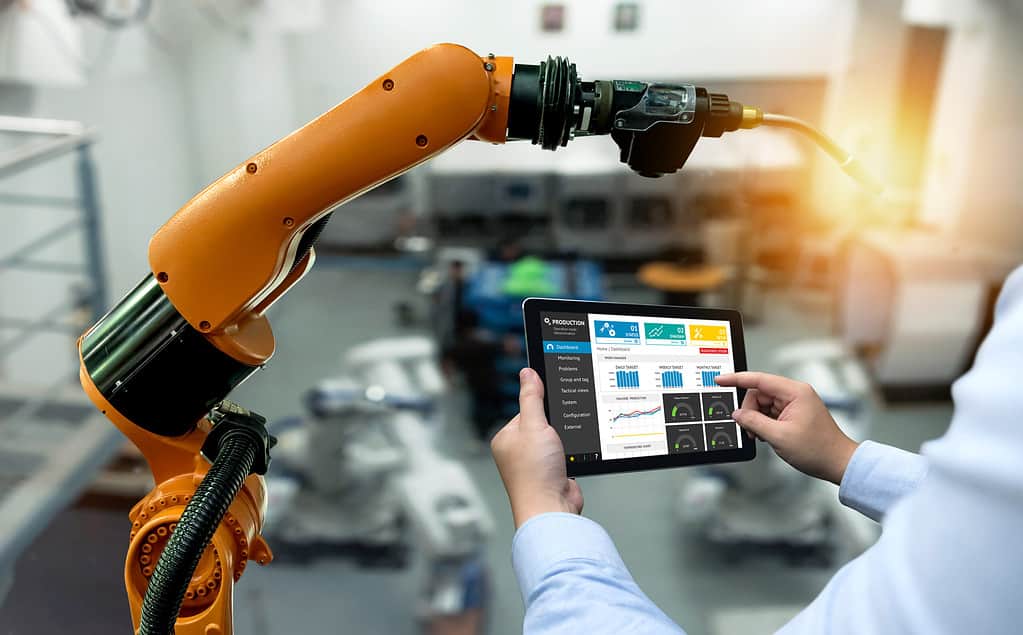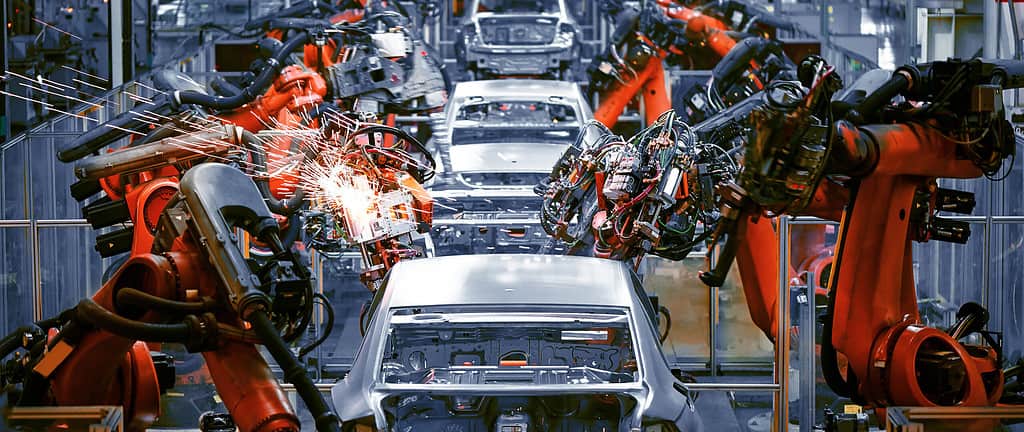
© Pedal to the Stock/Shutterstock.com
Key Points
- Any industry can benefit from automation.
- Agriculture and manufacturing have seen the most gains from the rise of automation.
- Automation is also a great fit for the likes of education, healthcare, and more.
Which industries benefit the most from automation? Automation is a hot topic in business, with many organizations opting to automate something. This is partly understandable, as you can simplify more grueling or tedious tasks by having them handled from the get-go. However, not every industry is suited to automation.
Being aware of where automation can benefit an organization can lead to increased revenue for many industries. So, with that in mind, let’s take a deeper dive into automation and see which industries truly benefit from implementing it on an industrial or process scale.
What Is Automation?

The International Society of Automation tells us that automation is “the creation and application of technology to monitor and control the production and delivery of products and services.” This is a fairly succinct definition of the concept and one that is immediately applicable to the likes of business use.
However, in a broader sense, automation applies across the band to just about every industry you can imagine. The application of technology is a given, especially for the era we find ourselves in. That said, many industries are adopting technology to boost efficiency, increase worker productivity, and streamline processes that might be customer-facing.
There is often the notion that automation is purely intended for tech-driven industries. While tech certainly does benefit from automation, it has applications across the board for most industries. Organizations like the International Society of Automation are hard at work to establish standards and training to further aid the implementation of automation for any business.
The Types of Automation
There are numerous types of automation, but we can distill them down to two main types. You’ve got process automation and industrial automation which are the prime contenders that you’ll see in most businesses.
Process automation can be applied either to an entire process or to simple steps of a process. Consider buying something on Amazon, it presents you with an item, you select it, pick the shipping option, and so forth. What used to be a complicated online endeavor now takes a couple of mouse clicks to get rolling.
Industrial automation is more suited for factory and industrial applications, as the name might suggest. Rather than dealing with something like software, this is where you’re automating entire manufacturing processes. This can expedite the process of manufacturing, allowing for completely automated steps of a process before the deliverable is finished.
Industries That Benefit the Most from Automation

Now that we’ve laid a bit of the groundwork for automation, which industries are best suited for it? The industries that benefit the most from automation could be a list a mile long. However, we’re looking at some key industries where the results are already being seen. Automation itself has been in workplaces for decades at this point, with some initiatives like the humble barcode being an example.
However, the point of today’s article isn’t to hypothesize about which industries could see massive benefits from the introduction of automation. Instead, it is more to highlight where automation has streamlined certain industries. When you consider the nature of business even 30 years ago, things have changed in a major way.
So, today, we aren’t focusing on hypotheticals and what-ifs, but rather on where the fruits of automation have paid off. The application of technology to business processes can date back to things like the invention of the cotton gin. However, understanding how the technology benefits an industry can be instrumental to future success and continued adaptation in the marketplace.
Supply Chain and Logistics
One big industry that benefits the most from automation is logistics, or the supply chain. In a nutshell, this is what drives modern businesses, and the industry behind it is vital to operation. Automation has been seen in a few different ways in this industry. The introduction of devices like barcode scanners and data terminals gives a real-time look at where items are along their journey.
Further, it is used in the packaging of goods and materials. Expecting the likes of a warehouse of people to pack up a massive raw steel order might seem like a tall order, and it is. However, the natural tempo of modern commerce dictates speed and precision. As such, it isn’t a shock to see robotics and programmed interfaces sorting out materials and preparing them for shipping.
While this does remove a good part of the human element from the equation, it also enables companies to receive their goods in a timely and efficient manner. In a way, supply chain and logistics are using both industrial and process applications for automation.
Transportation

We live in a car-centric society, so how do you automate the likes of transportation? Well, while the automotive industry benefits the most from automation, the average person surely has to forego some of those niceties. That isn’t the case, however, at least from my perspective. Automation has been taking place in transportation for at least a decade at this point.
Consider things like parking assists, brake assists, and lane keep systems in a modern automobile. These are intended to make drivers safer on the road, regardless of their destination. Further, we see the likes of automation across transportation systems like planes and railways as well.
Simply put, transportation is one of the top industries that benefit the most from automation. People need to get where they’re going, and simplifying the process and making it a safer one to boot is nothing to sneer at.
Education
When I grew up, education was just on the cusp of automation. Historically, education has been an industry resistant to the changing tides of businesses. However, that has changed substantially in the years since I left high school. What once was a paper-heavy, time-consuming process for grading papers and tests has become far simpler.
Educators and students alike get to benefit the most from automation in this case. Further, we’ve seen just how effective it is to do so. Students can receive grades in a matter of moments as opposed to waiting days or even weeks for the grading to be completed.
This also benefits educators because they’re able to keep detailed records of how their students are performing. The nature of education has changed drastically since the introduction of automation to the process, resulting in better learning resources and satisfied students.
Manufacturing

This is the big elephant in the room when it comes to talking about automation. Few industries have benefited the most from automation like manufacturing. Whether it’s small home electronics or massive industrial machinery, automation has changed the face of manufacturing. Even since the introduction of robotics and programmable interfaces, things have changed drastically.
The manufacturing industry today is a far cry from its status quo even 20 years ago. Processes and industrial applications of automation were some of the first seen in the manufacturing industry, and there has been plenty of time to improve upon the formula.
Automation in the manufacturing space is quite mature as a whole, showing why it is one of the few industries that benefit the most from automation. As products and services continue to rely upon automation in the manufacturing workspace, you can be sure to see more marvels of the craft.
Retail
Retail is one of the biggest driving forces behind the modern economy. This doesn’t just sit within the confines of the likes of big box and department stores, mind you. When you consider the size and scope of an operation like Amazon or Walmart, automation is going to come handy. As such, it doesn’t come as much of a surprise that retail is one of the industries that benefits the most from the use of retail.
Retail centers focus on improving customer experiences, which leads to many examples of process automation from shipping to what you see on the shelf or in your mailbox. Further, industrial automation is used on a large scale when it comes to actually packaging and shipping goods to customers. When you consider the sheer number of packages any modern retailer is dealing with, it makes sense.
Retail is where we saw the first blips of automation decades ago, thanks to the introduction of the barcode. Before its introduction, inventories were kept by hand, usually on reams of paper. The subsequent digitalization of retail inventories has benefitted from the work done to automate the entire process.
Agriculture

©Juice Flair/Shutterstock.com
Admit it, you don’t think of agriculture as a hub for automation. However, that couldn’t be further from the truth. The simple fact of that matter is that automation has taken over agriculture in a big way. Whether it’s monitoring crops, suggesting new rotations, or even watering plants, automation has been one of the burgeoning technologies that is making agriculture keep steep with the modern era.
Further, agriculture is one of the industries that benefit the most from automation. At the end of the day, it is about feeding people and providing raw materials. While the old-fashioned way is an admirable way of running a farm, that isn’t by any means profitable or efficient.
Automation has changed the face of agriculture, with higher crop yields being one of the cornerstones of the modern era. There are more people on the planet, but farmers are making sure those needs are being met thanks to the advent of automation on an industrial scale.
Healthcare
The post-pandemic world has changed how we interact with healthcare providers. Before it descended upon the world, it wasn’t uncommon to see many offices clinging to old workstations, paperwork, and a slew of antiquated practices. However, the post-pandemic world has seen healthcare embrace automation in a big way.
At its core, healthcare automation is happening on a process and industrial scale. Supplies are readily tracked and accounted for thanks to data terminals, computerized databases, and barcode scanners. Reams of paperwork have been eliminated thanks to the advent of patient pre-checks, with medical forms and insurance information being provided before they ever step foot in an office.
Finally, one of the areas where we see healthcare as an industry that benefits the most from automation comes down to the nature of modern medicine. With so much being driven by data in research, automation has helped bridge the gap between the theoretical and what gets put into practice.
Other Useful Tools and Concepts
Looking for some more tips and tricks to get things rolling? You might want to take a closer look at the remote-first companies that have made things work. Remote work is growing, thanks in part to the post-pandemic landscape, but for some other solid reasons as well. The companies we highlight might serve as an inspiration for your organization.
Additionally, you might want to consider how to maintain company culture while conducting remote teams. When it comes to remote work, the thing that slips first can be company culture. However, forging a strong identity means you don’t have to let the ethos of your organization fall by the wayside even if your office space is unoccupied.
Conclusion
The industries that benefit the most from automation will continue to see improved results and greater profits as time goes on. The less time spent on the busy work and drudgery, the better in my humble opinion. That lets the skilled workers and leadership behind these industries focus on what matters the most for their work.
The image featured at the top of this post is ©Pedal to the Stock/Shutterstock.com.